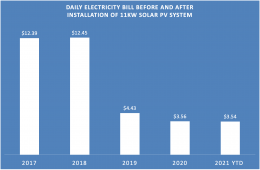Stepandwolf
Solar Enthusiast
- Joined
- Nov 14, 2020
- Messages
- 668
One of the issues I have is everyone, including the example above, assume tax credits. When I received quotes from three local companies who claimed "free systems", they had to change all their numbers when I said I wasn't eligible for a tax credit. I see the solar system sellers assuming tax credits because it makes their numbers better.
My power bills run from ~$55 to $85. Half the bill is the crap they add on. Fuel cost adjustment (renewable and non-renewable), renewable energy rider, customer charge, cost effective energy program, city/county franchise fees, and finally, three levels of sales tax. My $76.29 bill for August was $41 for energy, $35 in crap added on.
At the time I got the quotes (a few years ago), they all quoted me $15K installed. I calculated all the costs, i.e. parts, plans, etc. came to under $5K. With the drop in panel prices, the cost today would be less, but I bet they still want $15K.
As you get older, you may never live long enough for payback. Even if you live long enough, will you still be in the same home? I don't know the value added to a home sale for solar, but I am thinking it isn't so much, if at all, unless you get the right buyer.
My power bills run from ~$55 to $85. Half the bill is the crap they add on. Fuel cost adjustment (renewable and non-renewable), renewable energy rider, customer charge, cost effective energy program, city/county franchise fees, and finally, three levels of sales tax. My $76.29 bill for August was $41 for energy, $35 in crap added on.
At the time I got the quotes (a few years ago), they all quoted me $15K installed. I calculated all the costs, i.e. parts, plans, etc. came to under $5K. With the drop in panel prices, the cost today would be less, but I bet they still want $15K.
As you get older, you may never live long enough for payback. Even if you live long enough, will you still be in the same home? I don't know the value added to a home sale for solar, but I am thinking it isn't so much, if at all, unless you get the right buyer.



